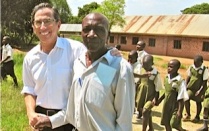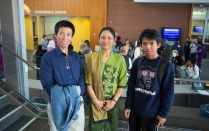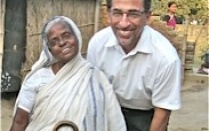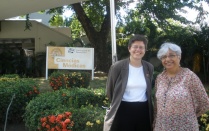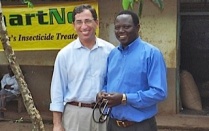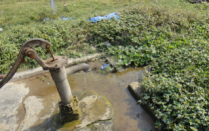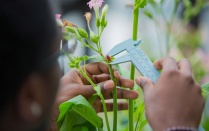UB musician, surgeons launch startups to solve problems in their industries
Left to right: SurgIno co-founders Thomas Langan, MD, Tatiana Boyko, MD, Stephen Chiang, MD, and Jinwei Hu, MD. All four co-founders are general surgery residents at UB. Credit: Sandra Kicman / University at Buffalo
The entrepreneurs recently took home third-place prizes in a statewide business plan competition
Release Date: June 18, 2019 This content is archived.
BUFFALO, N.Y. — Two teams of University at Buffalo entrepreneurs have launched new companies to solve problems they have experienced firsthand in the music and medical industries.
Both startups are moving forward with product development after placing third this spring in the New York Business Plan Competition (NYBPC), which encourages innovation and entrepreneurship throughout the state’s colleges and universities.
SurgIno, founded by four general surgery residents in the Jacobs School of Medicine and Biomedical Sciences at UB, is developing Tensure, a medical device that measures the tension of tissues as they pull away from each another when surgeons close an incision. The startup placed third in the NYSTAR MedTech and Well Being category of NYBPC.
Case in Point, founded by UB mechanical engineering student Quinn Bedore, is developing a guitar case that opens to become a guitar stand and guitar maintenance table. The startup placed third in the Consumer Products and Services category of NYBPC.
Both SurgIno and Case in Point have benefited from numerous resources at UB, including pitch practice sessions and mentoring from business experts and entrepreneurial faculty at the university.
Staff in UB’s Office of Business and Entrepreneur Partnerships (BEP) helped SurgIno and Case in Point prepare their presentations for Student 2 Biz, a local business pitch contest that serves as the regional competition for NYBPC. This year, all three of the top finishers in Student 2 Biz were from UB.
“These UB entrepreneurs are incredible,” says Christina Orsi, associate vice president for economic development at UB. “As they pursue their education and passion, they each identified a challenge and developed ideas to solve it. They then turned to the supportive network of services and programs at UB to help them turn a problem into a solution and begin the journey of moving an idea toward a marketable product right here in Buffalo.”
SurgIno: Innovations for surgeons, by surgeons
Left to right: SurgIno co-founders Jinwei Hu, MD, and Thomas Langan, MD, at the Student 2 Biz competition in Western New York. Not pictured are co-founders Tatiana Boyko, MD, and Stephen Chiang, MD. All four co-founders are general surgery residents at UB. Credit: Alex Cleary Pelc
The idea for SurgIno took root when UB general surgery resident Tatiana Boyko, MD, was in the operating room.
She was closing a large abdominal incision, and realized that surgeons could benefit from a tool that provides accurate measurements of the tension created as tissues pull away from each other at the point of closure.
Usually, doctors must estimate the tension based on experience, and Boyko saw the potential to improve care for patients by providing a more precise assessment. When tension is high at the site of a closed incision, patients are at risk of needing hernia repair later on if tissues begin to come apart again.
“I literally thought of this in the operating room as I was operating on a patient with a difficult case,” Boyko says. “If you close an incision under too much tension, it can fall apart, which is a horrible complication. Sometimes it happens slowly over time. I thought I could really benefit from a device that measured the tissue tension.”
At UB, Boyko enlisted three fellow surgeons — all residents in UB’s general surgery program — to launch SurgIno: Stephen Chiang, MD, Jinwei Hu, MD, and Thomas Langan, MD, MBA.
SurgIno’s Tensure device has small hooks that attach to a patient’s fascia — connective tissues located beneath the skin that enclose muscles and organs. When a surgeon is ready to close an incision, Tensure can be placed at the surgery site to make measurements. If a surgeon decides the tissue tension is too high, they can opt to perform a procedure such as a mesh repair that helps to reinforce the seam.
“Tensure is poised to improve care for patients and help patients, doctors and hospitals save on health care costs,” Hu says. “It takes the guesswork out when it comes to measuring tension, and helps surgeons perform surgery in a more optimal way. By doing so, Tensure has the potential to reduce future complications from common abdominal surgeries such as C-sections and hernia repairs.”
Resources at UB helped the company get off the ground. For example, all four co-founders took advantage of UB’s Surgery Plus Program, which enabled them to obtain additional degrees and do research in business, bioinformatics or biomedical engineering during their residency. This experience was invaluable as the team developed Tensure, competed in business competitions and pitched investors.
“Without the Surgery Plus Program, we wouldn’t have been able to form our startup,” Boyko says.
SurgIno also took advantage of business coaching or other programs for entrepreneurs through the Department of Surgery, BEP and UB’s Blackstone LaunchPad powered by Techstars.
Case in Point: A musician’s innovation for the music industry
Case in Point founder Quinn Bedore. Credit: Dave Burbank
Bedore, a guitar player, founded Case in Point to solve a problem that he’s seen firsthand: The need to travel light while keeping instruments safe.
He explains that often times, musicians will bring guitars to a gig but leave behind gear such as a guitar stand and maintenance table.
“You might lean the guitar up against the wall or a speaker when you need to put it down, and it might get chipped or damaged. It’s a common problem,” Bedore says. “Same thing with maintenance: You might lay it on a hard surface like a table to adjust the strings, and it might get damaged that way.”
Case in Point’s product, the Trinity Case, addresses these issues by acting as a guitar case, guitar stand and guitar maintenance table, giving musicians a safe place to store and work on their instruments when they’re on the go.
Bedore says the Trinity Case weighs about 15 pounds and will sell for the same price as mid-to-high-range guitar cases. He plans to have a small number of units on the market later this year.
Resources at the university have been crucial to the launch of Case in Point.
Bedore said one of the reasons he chose to attend UB was because he had heard great reviews of UB’s Blackstone LaunchPad powered by Techstars, an on-campus entrepreneurship program that provides business coaching, pitch contests, workshops, networking and other resources to help students succeed at turning their ideas into ventures.
Staff from the LaunchPad and BEP have assisted Bedore in launching his business and preparing for pitch competitions.
In addition, two UB alumni — Ryan Jaquin and Shane Nolan — have served as mentors to Case in Point. Jaquin and Nolan, both recent UB electrical engineering and MBA graduates, are the founders of Aviate Audio, a music electronics startup. Bedore met the two at a networking event during the Henry A. Panasci Jr. Technology Entrepreneurship Competition at UB, and the three have been in touch ever since.
“They were three steps ahead of me in the same industry, and they’ve been friends and mentors ever since we met,” Bedore says. “They’ve provided great advice. It’s a really supportive environment here for entrepreneurs — there are so many people at UB and in Buffalo who are willing to give you their time, their advice and their support.”
Media Contact Information
Charlotte Hsu is a former staff writer in University Communications. To contact UB's media relations staff, email ub-news@buffalo.edu or visit our list of current university media contacts.
We want to hear about what you are doing in the field of global health. UB faculty, staff, and students, please send us articles highlighting your work!



